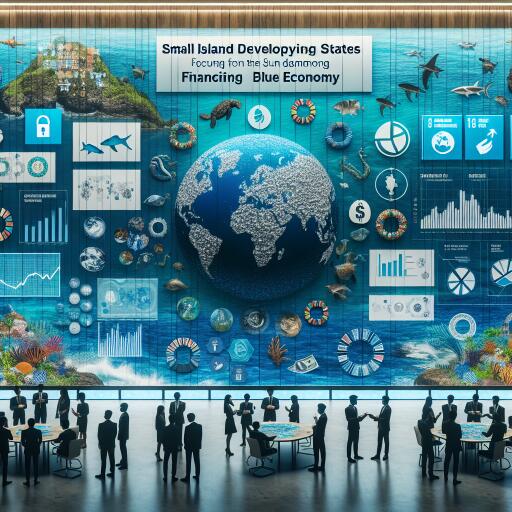
Achieving SDGs in Small Island Developing States: Financing the Blue Economy Through Collaboration
Small Island Developing States (SIDS) are uniquely challenged by their geographic and economic conditions—remote locations, minimal land, scarce human and capital resources—which render them particularly vulnerable to the detrimental impacts of climate change. Rising sea levels, extreme weather events, and effects on crucial sectors like agriculture and fisheries compromise their existence, development, and efforts towards sustainability. Moreover, these islands’ cultural heritage and indigenous livelihoods are endangered, exacerbating economic marginalization and unemployment.
The landscape of these challenges was further complicated by the COVID-19 pandemic, which not only strained the health and economic systems of SIDS but also diverted attention and resources away from climate adaptation and mitigation efforts. In a world where carbon emissions are returning to pre-pandemic levels, the negligible contribution of SIDS to global greenhouse gas emissions juxtaposes starkly against the profound impact climate change holds over them.
In response to their unique set of challenges, SIDS have looked towards the expansiveness of their surrounding oceans for solutions, adopting the blue economy framework. This concept aims to advance social equity, economic growth, and environmental preservation by promoting the sustainable use of ocean resources. From sustainable fisheries to responsible aquaculture, the blue economy model presents a promising path forward for SIDS, aligning closely with the Sustainable Development Goals (SDGs), particularly those focusing on poverty eradication, food security, gender equality, sustainable energy, decent work, climate action, and the conservation of marine life.
A variety of countries have begun incorporating blue economy principles into their development strategies, recognizing the significance of the ocean in driving economic growth, ensuring food security, and addressing climate change. This strategy comprises sustainable fisheries management, marine renewable energy development, responsible aquaculture, and sustainable tourism—offering a holistic approach to climate change adaptation and fostering a sustainable, climate-neutral economy.
Climate Change Financing: The Heart of the Challenge
Despite the essential role of the blue economy in the sustainable development of SIDS, securing finance for blue economy initiatives remains an uphill battle. The geographical and environmental peculiarities of SIDS increase the cost of implementing resilience strategies, thereby complicating access to adequate climate financing. This financial gap persists despite the creation of international financing mechanisms intended to support climate action in developing countries.
The current climate financing structures often overlook the unique vulnerabilities of SIDS, making it difficult for these nations to tap into available resources. Complex application processes, bureaucratic hurdles, and the high cost of project implementation further hinder their ability to secure needed funds. Moreover, some SIDS, classified as high- or middle-income countries, find themselves ineligible for concessional financing despite facing severe climate-related challenges.
The United Nations estimates adapting to climate change could cost SIDS between 22 and 26 billion USD annually—a staggering sum that underscores the critical need for tailored financing solutions.
Innovative Financing Solutions for the Blue Economy
To navigate these financial obstacles, SIDS are exploring alternative financing mechanisms such as blue bonds, debt-for-nature swaps, and impact investment models. Blue bonds, in particular, have emerged as a viable tool for raising funds dedicated to sustainable ocean-related projects, attracting investment in marine conservation, renewable energy, and sustainable fisheries. Despite challenges, such as defining eligible activities and ensuring robust monitoring, blue bonds have successfully funded conservation efforts in nations like Belize, Ecuador, and Seychelles, the latter being the first to launch such an initiative.
Similarly, debt-for-nature swaps have allowed countries to redirect portions of their debt repayments towards conservation and blue economy strategies. The Seychelles, for example, has used this approach to significantly expand its marine protected areas, thereby exceeding its commitment to protect 10 percent of its exclusive economic zone. Impact investments and private-sector funding also offer promising avenues for supporting blue economy initiatives, mobilizing capital for projects with significant social and environmental impacts.
As SIDS continue to navigate the complexities of climate change financing, the role of international collaboration becomes ever more evident. Significant efforts and pledges made in international forums, like COP28, highlight the growing recognition of the need to support SIDS in their transition towards a blue economy. Despite these advancements, more substantial efforts are required to establish accessible and efficient financing frameworks that can withstand the effects of climate change.
The forthcoming International Conference on Small Island Developing States is expected to serve as a pivotal moment for these nations to unite in their call for bold and decisive global action. By emphasizing international collaboration and innovative financing solutions, SIDS can hope to achieve a resilient and prosperous future, anchored firmly in the principles of the blue economy.





Leave a Reply